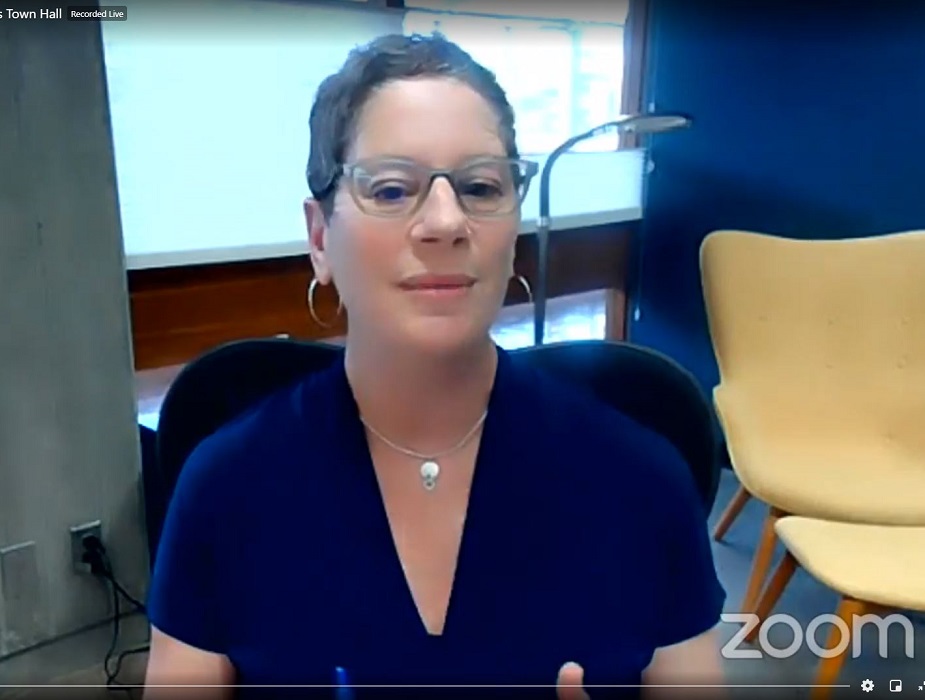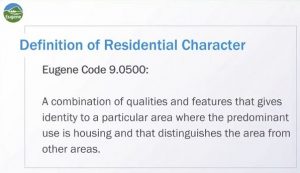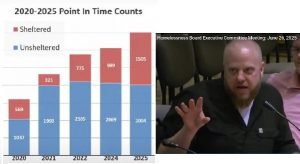City, county officials outline strategies for homelessness crisis
6 min read
Lane County Commissioner Laurie Trieger discussed the county's role in addressing homelessness, health, and human services at a Town Hall June 3.
Elected officials from Eugene and Lane County teamed up on June 3 with a town hall that addressed our growing crisis, homelessness. Marty Wilde was the host.
Rep. Marty Wilde: [00:00:11] Thank you for joining us. I’m State Rep. Marty Wilde from House District 11, the Kalapuya district, and I will be your host for tonight’s “Housing, Healthcare and Human Services” Town Hall with Lane County Commissioner Laurie Trieger, and Eugene City Councilors Alan Zelenka, Claire Syrett, and Matt Keating.
John Q: [00:00:27] The elected officials explained the different roles for the City and County; housing and health services are provided by the county. Commissioner Laurie Trieger.
Lane County Commissioner Laurie Trieger: [00:00:37] County services are wide ranging. We are primarily a service provider at Lane County as an organization. The public safety components of the county organization includes the sheriff, the D.A., the county court system, juvenile justice, and the county jail. We have 69 county parks in Lane County, thousands of miles of roads and bridges. Of course, we run elections. The local elections division is part of Lane County government. Lots of land use decisions that get made at the county level. And we are also your local housing authority, especially also relevant to the discussion tonight.
Thank you for supporting
local citizen journalism
We run six federally qualified health centers and about 30,000 people in Lane County call a Lane County clinic their primary medical home. We also of course run behavioral health services and in the public health division, in addition to disease prevention, restaurant inspections, and so on, is the WIC program: Women, Infants and Children, near and dear to my heart as a former WIC mom and knowing how important those supports for youth and families are. And disaster preparedness and emergency response also fall within county services.
So people are interacting with county government every day, and don’t even realize that is the entity responsible for the services that they’re receiving.
And in Lane County, most people know us because we collect your property tax. But what you may not know is the county itself only keeps 11 cents on the dollar and others. Otherwise those dollars are allocated out to various special districts like fire districts and particularly schools is the largest. So when you pay your property tax to Lane County only keeps 11 cents on the dollar. And we do all those services that I just mentioned them more. With those monies, we have our hearing on our coming fiscal year budget on the 15th of June with adoption slated for a week later.
And it is just shy of an $800 million budget. And only about one seventh of that as general fund, which means only a very small portion of that budget is anything that we have really discretion to move around or reapportion where we spend that the rest of the money is contingent on spending in a very particular way.
Rep. Marty Wilde: [00:02:40] First question goes to Commissioner Laurie Trieger. Lane County and or Eugene specifically have very high rates of unhoused folks per capita, and far too many of our neighbors are having to sleep outdoors. What are the city and county doing to ensure that everyone has a safe, warm, dry place to sleep at night?
Lane County Commissioner Laurie Trieger: [00:02:56] Counselor Zelenka outlined some really important contributing factors to the crisis of unsheltered folks on our streets.
Another issue is historic and systemic income inequality. We know that the single largest demographic that we are anticipating of people in deep poverty and ultimately potentially on the streets, as well as women aging into poverty because of historic wage inequality positions, jobs that don’t offer retirement savings, stepping out of the workforce for years at a time and foregoing retirement savings and income and so on. So not only are we seeing increasing numbers of people homeless, but we’re seeing a real shift in the demographics of who is homeless, more and more elderly folks. And we’re more people with chronic and persistent co-diagnoses, mental and medical needs.
So to that end, one of the things that the county is doing we believe the best way to prevent homelessness is to provide housing. And we are your public housing authority, and we are— as fast as we can find the land and the funding and the partnerships— building as much permanent supportive housing as we can. Permanent supportive housing is important because it has the wraparound services that go along with it to keep people stabilized and housed.
So yes, we need lots more housing of all different sizes and all different for all different income levels. But permanent supportive housing is a very specific targeted approach. And in particular, what we have developed is something called the FUSE model, which stands for Frequent User System Engagement. And what that is identified the small percentage of chronically homeless people who are using the most services, whether that’s emergency room services, fire, and ambulance and other medical services and so on because the resource the county and city are spending to serve relatively few people means fewer resources to serve more people who maybe don’t have as dire needs that could a needs that could be addressed with fewer resources.
So the FUSE model is a way of integrating all the different providers in the community, identifying who these folks are and prioritizing them for entry into these permanent supportive housing developments. You may have heard about The Commons on MLK. That is the first Housing First model in Oregon. We opened that and it is just in sequentially become fully occupied 51 units for individuals who have been chronically homeless.
We are breaking ground later this summer on a 45-unit individual permanent supportive housing site in downtown Eugene at 11th and Charnelton. We are nearing completion of 15 family housing units just on the west end of the fairgrounds of permanent supportive housing for families with children. So we’re doing a lot in terms of specifically meeting the needs of folks on the street, street outreach, work and coordination with our service provider network to get folks their basic needs met and provide Hygiene and sanitation at both the sanctioned rest stops and so on as Councilor Syrett mentioned, but also at the unsanctioned camps that have sprung up due to COVID with reduced shelter, beds, and folks needing to come in closer to services.
For those watching, you’ve probably seen the Washington Jefferson park camp, as well as the 13th and Chambers camp. And we’re working county and city together to identify sites where we can in a methodical, strategic and supported way, relocate folks from those camps to places that can be a little more long-term with a little more infrastructure and support in a safer, more compatible location.
And so finally, what I’ll say is the greatest challenge. People want to think it’s money. In fact, it’s that compatible location piece is one of the single hardest things I think in addressing unsheltered folks.
John Q: [00:06:32] City Councilor Matt Keating addressed that issue, of finding locations for housing.
City Councilor Matt Keating: [00:06:38] Staff has been doing stellar work behind the scenes to identify and locate the right property. There’s been, I want to say, 23 public properties that are under consideration, 12 that are privately held. It’s a public-private-engaging conversation, a partnership with both the county and the city and the for-profit sector to find the right space. And on June 23rd, staff will be bringing to council options for us to take direct action. So for folks out there who are just wanting to see it happen now, there is a process and that those locations have to be the right location.
Should we find that right location and get folks connected to wraparound services, a respite center, and stop moving folks, telling folks you can’t be in A, but there’s no B, there’s no alternative for you to go to—If we pull this off in a collaborative county, city, state effort, with critical federal dollars, this will be the hallmark achievement of my elected service to date.
John Q: [00:07:41] in this special report, we take the summary comments provided by the elected officials at the Town Hall, and take a deep dive to look at efforts in the community. Alan Zelenka mentioned the mental health crisis, Claire Syrett mentioned Opportunity Village, and Matt Keating mentioned Nightingale Hosted Shelters.



